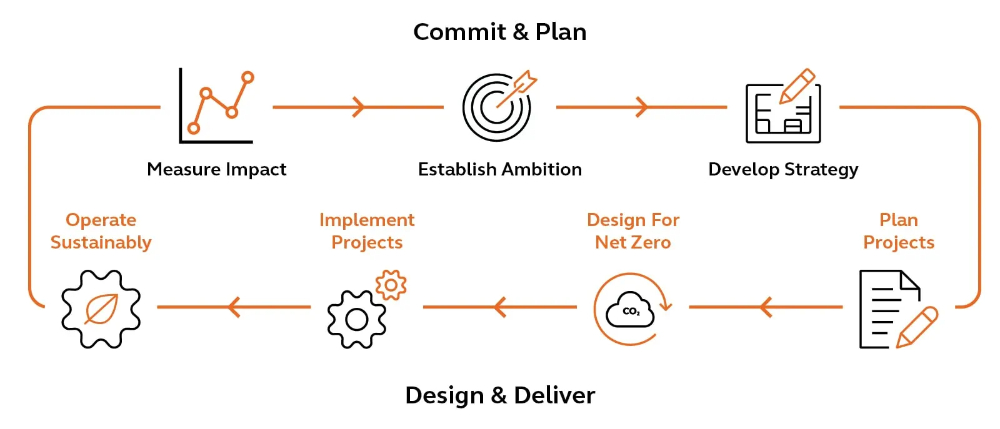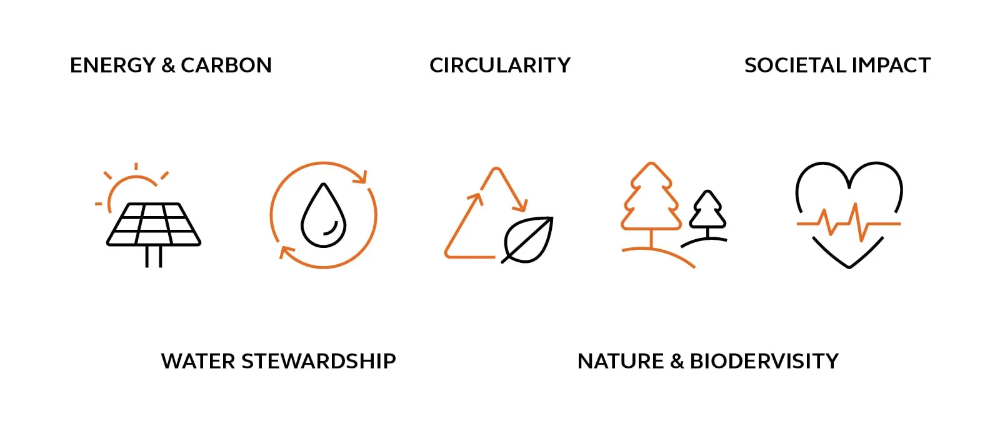- with readers working within the Environment & Waste Management, Technology and Construction & Engineering industries
Many organizations have ambitious net-zero goals, but translating those into measurable, real-world outcomes is where the challenge begins. For companies further along in their decarbonization journey—particularly those with a reputation to uphold—their decarbonization strategies need to be more targeted, more actionable and more tailored to their specific business context.
At Arcadis, we help clients bridge the gap between strategy and implementation by combining deep technical knowledge with on-the-ground expertise. Whether you're optimizing energy use, planning capital investments or rethinking lifecycle emissions, our approach is built around what works best for your business and your sustainability goals—while addressing the sustainability challenges in business that often emerge during implementation.
A collaborative approach from boardroom to boiler room
No two organizations are the same, which means no two decarbonization strategies should be either. Understanding a client's business—how it operates, what drives it and where the biggest impact can be made—is the essential first step.
Wherever our clients are in their decarbonization journey—from the boardroom to the boiler room—we listen. And by that, I mean we really do a deep dive into understanding your business, your needs and what drives it. From there, we'll tailor our team and our services to support clients' business by creating a measurable solution that's best for the environment, for their business to grow and that makes financial sense.

From boardroom to the boiler room
This collaborative approach ensures that what's implemented on the ground directly supports the broader goals for a wholistic decarbonization strategy set at the top. Our support often includes:
- Custom-built teams based on sector, location or complexity
- Partnerships with implementation specialists, such as Mission Zero
- Integration of decarbonization strategy into business growth planning
- Connection with wider sustainable design teams positioned under the five sustainability pillars:

Setting baselines and measuring what matters
For implementation to be effective, it has to be measurable. Many businesses—whether they operate in industrial manufacturing, life sciences or almost any other sector—struggle not because they lack ambition, but because they haven't established clear baselines or a method for tracking progress related to their business's sustainability challenges. That's where we come in.
We establish a baseline and measure progress to highlight the impact of your CapEx investments compared to OpEx savings, including energy, water and emissions reductions. This is mapped over a timeline aligned with your sustainability strategy. A key part of this process is understanding where financial investments originate—whether from CapEx (typically funded by corporate) or OpEx (often covered by the site). To identify the best solutions, we use metrics like Total Cost of Ownership (TCO) and Net Present Value (NPV). By combining TCO with carbon reduction (€ per tCO2 reduced), we provide valuable insights into cost efficiency. This approach allows us to calculate the Marginal Abatement Cost (MAC), helping you identify the most cost-effective pathways to achieve both short-term and long-term carbon reduction goals.
The following are just a few of the items that we help our clients keep tabs on:
- Capital expenditure (CapEx) vs. long-term operational savings (OpEx)
- Energy use, broken down by source
- Water usage and savings potential
- Emissions reductions in line with sustainability targets
Setting a baseline and mapping key metrics is a game-changer for businesses looking to drive sustainability. It not only makes it easier to justify investments and confidently report progress; it also helps uncover new opportunities for improvement. By using the metrics noted above to create a tailored roadmap, businesses can clearly see the cost of inaction over time and take strategic steps toward a more sustainable and financially prosperous future.
Boots on the ground: delivering real-world results
Technical excellence only goes so far without the operational expertise to back it up. Arcadis brings together strategists, engineers and project delivery teams who know how to get things done—on site, under pressure and at scale. We are in the design phase for a near net-zero data centre in San Jose, California that has been designed to support the local community through its greenhouse and retail centre.
Take these two completed projects delivered from concept through to completion on site for two multinational pharmaceutical companies:
1. We were responsible for the design and construction of a major site expansion where one of the primary project goals was to put sustainability, operational excellence and future-proofing front and center.
Challenge:
![]() Double the
building area on an existing site without compromising current
energy goals.
Double the
building area on an existing site without compromising current
energy goals.
Approach:
![]() 98% of energy
sourced from renewables
98% of energy
sourced from renewables
- 40% from on-site generation
- 58% from certified renewable grid imports
![]() Energy-efficient design
Energy-efficient design
![]() Independent
energy modeling to track and demonstrate savings
Independent
energy modeling to track and demonstrate savings
Impact:
![]() 38% energy
cost reduction
38% energy
cost reduction
![]() $220,000 in
annual energy savings
$220,000 in
annual energy savings
![]() 950 tons of
carbon saved each year
950 tons of
carbon saved each year
A client asked us to decarbonize one of its new global sites. The initiative was part of a drive by the company to achieve carbon zero in its own operations and carbon neutrality across its remaining value chain
Challenge:
![]() Deliver a NZEB
22,000m sq biopharmaceutical facility new build that fills it's
entire site.
Deliver a NZEB
22,000m sq biopharmaceutical facility new build that fills it's
entire site.
Approach:
![]() Create a
fossil fuel free site
Create a
fossil fuel free site
![]() Use 100%
Renewable energy (nearby wind farm PPA & onsite
renewables)
Use 100%
Renewable energy (nearby wind farm PPA & onsite
renewables)
![]() 636 kWp of
roof mounted Solar PV generating approximately 603 MWh of
electricity per annum
636 kWp of
roof mounted Solar PV generating approximately 603 MWh of
electricity per annum
![]() Energy backup
in the form of a 2.5MW/2.5MWh Battery Energy Storage System (BESS)
providing backup power functionality to the site
Energy backup
in the form of a 2.5MW/2.5MWh Battery Energy Storage System (BESS)
providing backup power functionality to the site
![]() Use of heat
pumps and heat recovery on the AHU systems
Use of heat
pumps and heat recovery on the AHU systems
 Impact49011
Impact49011
![]() Fossil Fuel free
site
Fossil Fuel free
site
![]() 28% Carbon F-Gas
reduction
28% Carbon F-Gas
reduction
1.7m kWh energy savings through energy efficient design (EED)
Solving the ROI puzzle
One of the biggest challenges of sustainability in business is the financial model. While traditional business investments often deliver returns within one or two years, decarbonization solutions typically require more time. That doesn't make them less valuable—but it does call for a new approach to funding and scheduling.
We can support our clients in establishing a dedicated sustainability-focused CapEx budget, with an accepted longer ROI compared to other CapEx projects. This approach can help accelerate future projects that might otherwise stall due to budget timelines or traditional ROI expectations.
Turning ambition into competitive advantage
For businesses with a strong sustainability profile, implementing decarbonization projects isn't just about hitting internal targets—it's about staying ahead of stakeholder expectations and reinforcing brand leadership.
We at Arcadis are passionate about decarbonization because we really believe we are part of the last generation that can make meaningful change for the planet. Our clients are in position to be a big part of changing the dial in sustainability, and I know we can support our businesses to reduce their energy usage while growing—and it can be a no-brainer.
Proactive implementation helps companies:
- Increase energy independence
- Drive long-term financial savings
- Mitigate future regulatory risks
- Position themselves as sustainability leaders
And for many, it becomes a turning point. Many of our clients ask us, "Why didn't we do this sooner?"
Ready to move from strategy to action?
Arcadis combines global sustainability expertise with local delivery to help large businesses put their plans into motion. Whether you're scaling renewables, integrating low-carbon design or building a long-term funding strategy, we're ready to help make your goals a reality.
The content of this article is intended to provide a general guide to the subject matter. Specialist advice should be sought about your specific circumstances.

